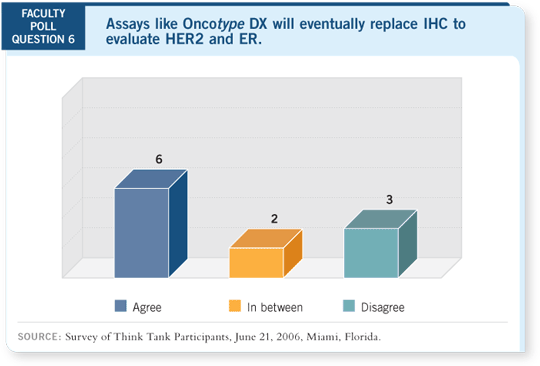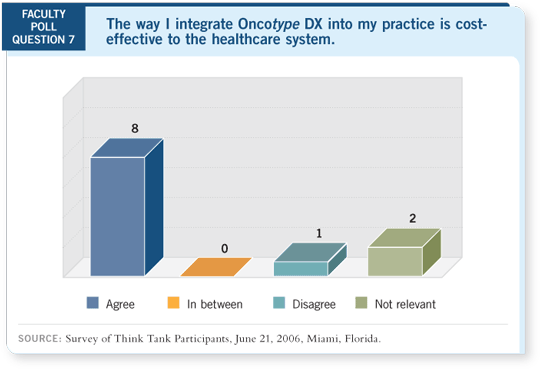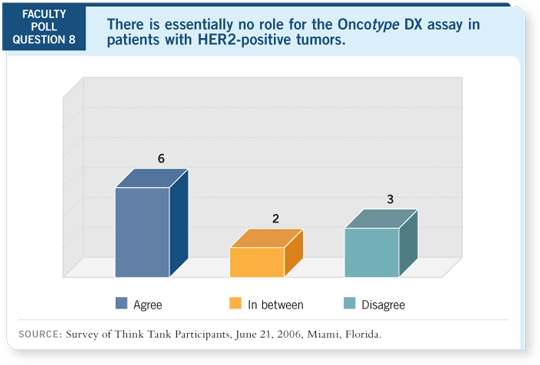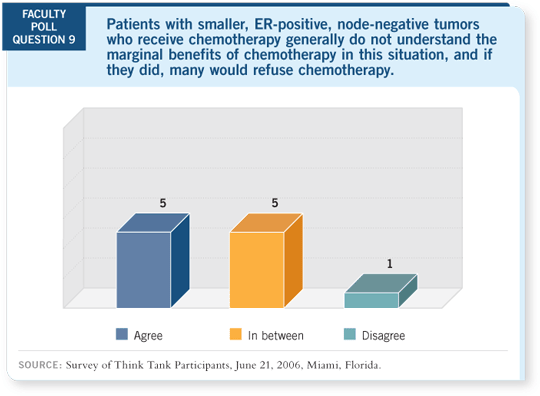

Select Excerpts from the Discussion
CD 1, Tracks 15-16
 DR LOVE: Cliff, where do you see the Oncotype DX assay being most useful,
clinically?
DR LOVE: Cliff, where do you see the Oncotype DX assay being most useful,
clinically?
 DR HUDIS: I see the test as particularly relevant for a patient who’s on the
fence about chemotherapy. For the borderline case, in which we’re not sure
and we have a high recurrence score, I believe it provides a valuable service. I
have a little more reservation at the moment about using the test to withhold
chemotherapy. A low recurrence score does not, with those confidence intervals,
exclude the possibility of benefit.
DR HUDIS: I see the test as particularly relevant for a patient who’s on the
fence about chemotherapy. For the borderline case, in which we’re not sure
and we have a high recurrence score, I believe it provides a valuable service. I
have a little more reservation at the moment about using the test to withhold
chemotherapy. A low recurrence score does not, with those confidence intervals,
exclude the possibility of benefit.
I believe we’re left, right now, still discussing the values the patient brings to
the table. Some patients are uninterested in chemotherapy and no recurrence
score will convince them. Conversely, a fair number of patients — at least
in our practice — if we don’t offer them chemotherapy, are going across the
street for it. A low recurrence score is of no particular value to them.

 DR WOLFF: To me the key issue with the Oncotype DX assay, as with any other test, is that you should order it if you’re going to do something with that
specific information. At my institution, we have requested that the medical
oncologists only order the Oncotype DX assay if it’s going to help make a
decision with the patient. If the patient says, “I want chemotherapy regardless,”
or, “There’s no way you’re going to use chemotherapy,” I don’t need the
Oncotype DX assay to add information.
DR WOLFF: To me the key issue with the Oncotype DX assay, as with any other test, is that you should order it if you’re going to do something with that
specific information. At my institution, we have requested that the medical
oncologists only order the Oncotype DX assay if it’s going to help make a
decision with the patient. If the patient says, “I want chemotherapy regardless,”
or, “There’s no way you’re going to use chemotherapy,” I don’t need the
Oncotype DX assay to add information.
 DR HENDERSON: We all think we’re good at estimating risk. I believe we
may not be entirely correct because we tend to weigh one bad factor out
of multiple good factors disproportionately. It’s too bad we have not yet
conducted a study in which we test our ability prospectively to calculate risk.
If we found that we weren’t so good and that the Oncotype DX assay resulted
in a better distribution of the appropriate therapies for patients, the cost of the
test might be more than outweighed by the appropriate use of therapies.
DR HENDERSON: We all think we’re good at estimating risk. I believe we
may not be entirely correct because we tend to weigh one bad factor out
of multiple good factors disproportionately. It’s too bad we have not yet
conducted a study in which we test our ability prospectively to calculate risk.
If we found that we weren’t so good and that the Oncotype DX assay resulted
in a better distribution of the appropriate therapies for patients, the cost of the
test might be more than outweighed by the appropriate use of therapies.
CD 1, Track 19
 DR LOVE: Cliff, does the Oncotype DX assay have a role for patients with
HER2-positive tumors?
DR LOVE: Cliff, does the Oncotype DX assay have a role for patients with
HER2-positive tumors?
 DR HUDIS: Certainly some cases with HER2-positive tumors have a low
recurrence score. If you weren’t considering the use of trastuzumab in the context of how it has been tested, it might matter. However, since trastuzumab
is almost exclusively going to be used with chemotherapy, I don’t see a
role for the Oncotype DX assay in those patients.
DR HUDIS: Certainly some cases with HER2-positive tumors have a low
recurrence score. If you weren’t considering the use of trastuzumab in the context of how it has been tested, it might matter. However, since trastuzumab
is almost exclusively going to be used with chemotherapy, I don’t see a
role for the Oncotype DX assay in those patients.

 DR WOLFF: In clinical practice, I don’t use the Oncotype DX assay for patients
with tumors that are smaller than one centimeter or those that are HER2-positive.
DR WOLFF: In clinical practice, I don’t use the Oncotype DX assay for patients
with tumors that are smaller than one centimeter or those that are HER2-positive.
In the NSABP validation studies, only about 16 percent of 650 patients had
tumors that were smaller than one centimeter. So you’re talking about roughly
100 patients with tumors smaller than one centimeter (Paik 2004). A split
exists across all three groups.
Therefore, I have no idea whether the assay results apply to smaller tumors.
You have to be very careful, if you order a test, about whether your patient’s
case applies to the patient group.
 DR GEYER: I would disagree with the notion that we wouldn’t use the
Oncotype DX assay for patients with smaller tumors. We know that some of
those smaller tumors do recur.
DR GEYER: I would disagree with the notion that we wouldn’t use the
Oncotype DX assay for patients with smaller tumors. We know that some of
those smaller tumors do recur.
If you were struggling with a decision about whether to use chemotherapy,
even for a small tumor, the high recurrence score would add credence, because
it would suggest a benefit. The patient is going to have a substantial relative-risk
reduction.

It’s hard to imagine that, biologically, the relative risk reduction for a patient
with a high recurrence score is going to be different in a smaller tumor. With
a 75 percent relative reduction, the absolute benefit — even with smaller
tumors — could be substantial (Paik 2006c).
Select publications

